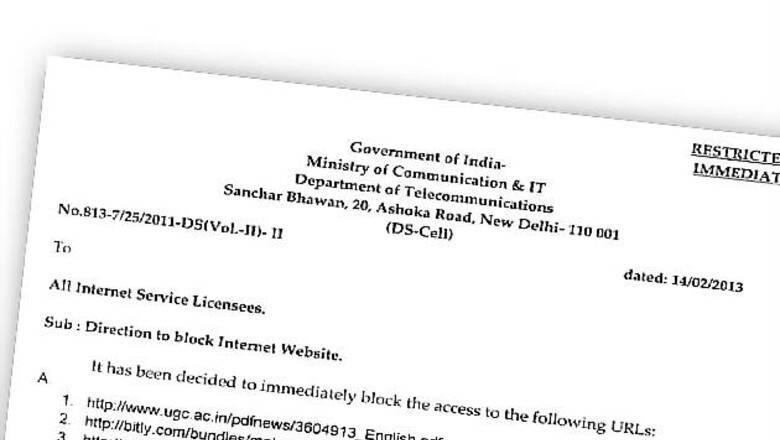
views
The Department of Telecom, under a court order, recently ordered blocking of 78 URLs, 73 of which contained content apparently critical of the controversial Indian Institute of Planning and Management (IIPM) and its head Arindam Chaudhuri, including a University Grants Commission notice on the unrecognised status of IIPM. The URLs blocked included many from mainstream news organisations such as Firstpost, Outlook, Times of India, Rediff, Indian Express and Economic Times, largely because they don't paint a pretty picture of the chain of educational institutions headed by the 'management guru'. Do such blocks help, given the architecture of the Internet? SC lawyer & cyber law expert Pavan Duggal joined IBNLive readers for an interaction on the issue.
Q. Sir, my question may be related to you. But my concern on poor students studying under IIPM makes me ask you. How will it affect students who are half-way through? Asked by: deepak krishnamurthy
A. Blocking of certain websites on an order of the court, would not affect students who are half-way through. However, the uproar of public sentiments in this case, could have an impact on the perceptions of people.
Q. Blocking URLS which criticizes IIPM , isn't that violating my freedom of speech? Asked by: monish
A. The fundamental right to Freedom of speech and expression under Article 19(1) of the Constitution of India is not an absolute right but is subject to certain reasonable restrictions that may be imposed. Blocking is covered under the IT Act, 2000 and could be covered under reasonable restrictions.
Q. Actually, what this issue is about. How DoT is trying to justify its move? Asked by: kalyan
A. The issue relates to legal proceedings, pending before a Gwalior court, in which the court directed the blocking of certain URLs. DOT is merely following the direction of a court of law. If DOT did not comply with the court order, it could potentially face contempt of court.
Q. Arindam Chaudhuri claims the URLs link to content that may be defamatory from IIPM's perspective. Who decides whether content is defamatory? What is the test to distinguish defamatory content from fact? Asked by: Chiradeep
A. In this case , the matter is sub-judice and the court will decide the matter. Under the Indian cyberlaw, any affected person can move the court for directing the blocking of any defamatory content.If the court is convinced about the defamatory content, it directs blocking. Alternatively, blocking can also be ordered by the Government. Under the IT Rules, 2011, if any affected person complains to the relevant intermediary about some defamatory or offensive content, the intermediary is duty bound to act within 36 hours and remove /disable access to such content. Under the IT Act, the complainant is given the power to complain about any electronic content, which in his/her opinion, is defamatory. Truth is always a valid defence to defamation. However, the same can only be proved by adducing relevant evidence.
Q. How can someone allow an IP to be blocked specifically of a non-private institution like UGC? Isn't the validity/reason for blocking checked? Asked by: Jeril
A. In this case, blocking has been done on court orders. Since the matter is sub-judice, I will refrain from making any comments on the same. As per information in the public domain, the URL of a webpage on UGC website has also been directed to be blocked. This incident demonstrates the need for coming up with appropriate guidelines which should stipulate the limited specific circumstances, under which blocking can be effected. There is a need for coming up with appropriate mechanisms which should prevent misuse of the phenomenon of blocking. Further, there is a need for providing an opportunity of being heard to the relevant web URL owners, before the same is blocked. In any case, blocking is a failed experiment from the word go, as it is only counter productive and does not have any effectiveness, given the intrinsic architecture of the Internet today.
Q. For those whose websites/pages have been blocked -- Can they challenge the decision of the Gwalior court at a higher court? In your opinion, does their case have any strength? Asked by: Sharma
A. Affected persons can challenge the said order. They can go to the same court and ask for recall/review of the said order or could approach the higher court under appeal against the said order. If the blocked website owners can show to the court that their websites/pages do not have any content, which is violative of the law, they have very good case at their hands.
Q. There are various means to take information, criticism to the users like FB, twitter etc etc. How can blocking some URLs can stop this? Asked by: deepak krishnamurthy
A. Blocking in today's context, is a toothless tiger. It is completely irrelevant given the fact that there are so many ways available on the internet, using proxy servers to access the said blocked websites in India. Blocking of websites is similar to trying to block water of a running river, a mile wide, with a six feet concrete sheet and hoping that the entire water of the running river can be stopped. In today's age of information overflow and given the nature of the Internet, blocking has ceased to have any effective relevance.
Q. Doesn't a case like this double up as an allied marketing exercise for a fledgling institute like IIPM? While casting no aspersions on their operations, as a new business, I would like to have any information that shows me in negative light removed from the web. Be it based on fact or on fiction, my case at-least gets my negative publicity blocked on the web. Isn't this phenomenon quite scary for prospective students who would want to seek unbiased information about the institute before applying for an admission there? Asked by: Nikhil
A. Since the matter is subjudice, I would refrain from commenting on the said case. However, we need to appreciate that courts of law in India would ultimately only allow the blocking of such websites, which have content, which is violative of the law prevailing for the time being in force. Unbiased analysis and comments, which do not violate the law, would still be there on the Internet. There are thousands of sources of information on the Internet and it would be an impossible task to block all the available information on the Internet. Exercising due diligence would be the only mantra that all persons, including prospective students, have to follow, before taking any informed decisions.
Q. Can such type of orders have parallels with the behaviour of China as it also restricts social media in a similar way Asked by: Hitesh
A. Blocking as a phenomenon has been granted legal sanction and validity, thanks to the Information Technology (Amendment ) Act, 2008. However, you cannot compare apples with oranges. Blockings in this case has been a result of court order, which cannot be compared with organizational practices in other jurisdictions, where blocking is routinely carried out.
Q. How does it portray mindset of politicians like Kapil Sibal who on one end appear to be liberal and on the other end appear to be dictatorial Asked by: Manush
A. This case of blockings is a result of court order, passed by a court of competent jurisdiction.
Q. Has blocking of websites anything to do with upcoming general elections as govt seems to feel threatened and wants to go aggressive and seems to have lost its balance of mind Asked by: Manav
A. These blockings are a result of an order, passed by a court of competent jurisdiction and has no connection to the upcoming elections.
Q. Many posts on satire sites like Faking News, Unreal Times too were blocked for some spoof on IIPM. Do students decide by stories on sites? Also, Arindam's clarification accused UGC, AICTE being full of corrupt officials. Is that not defamatory charge? Shows his insecurity? What's wrong with UGC notice that said IIPM is not a university to grant a degree? Asked by: @Equateall
A. Since the matter is subjudice, it is not fair to comment on the merits of the case. However, it is well recognized principle of law that truth is a valid defence to defamation.




















Comments
0 comment